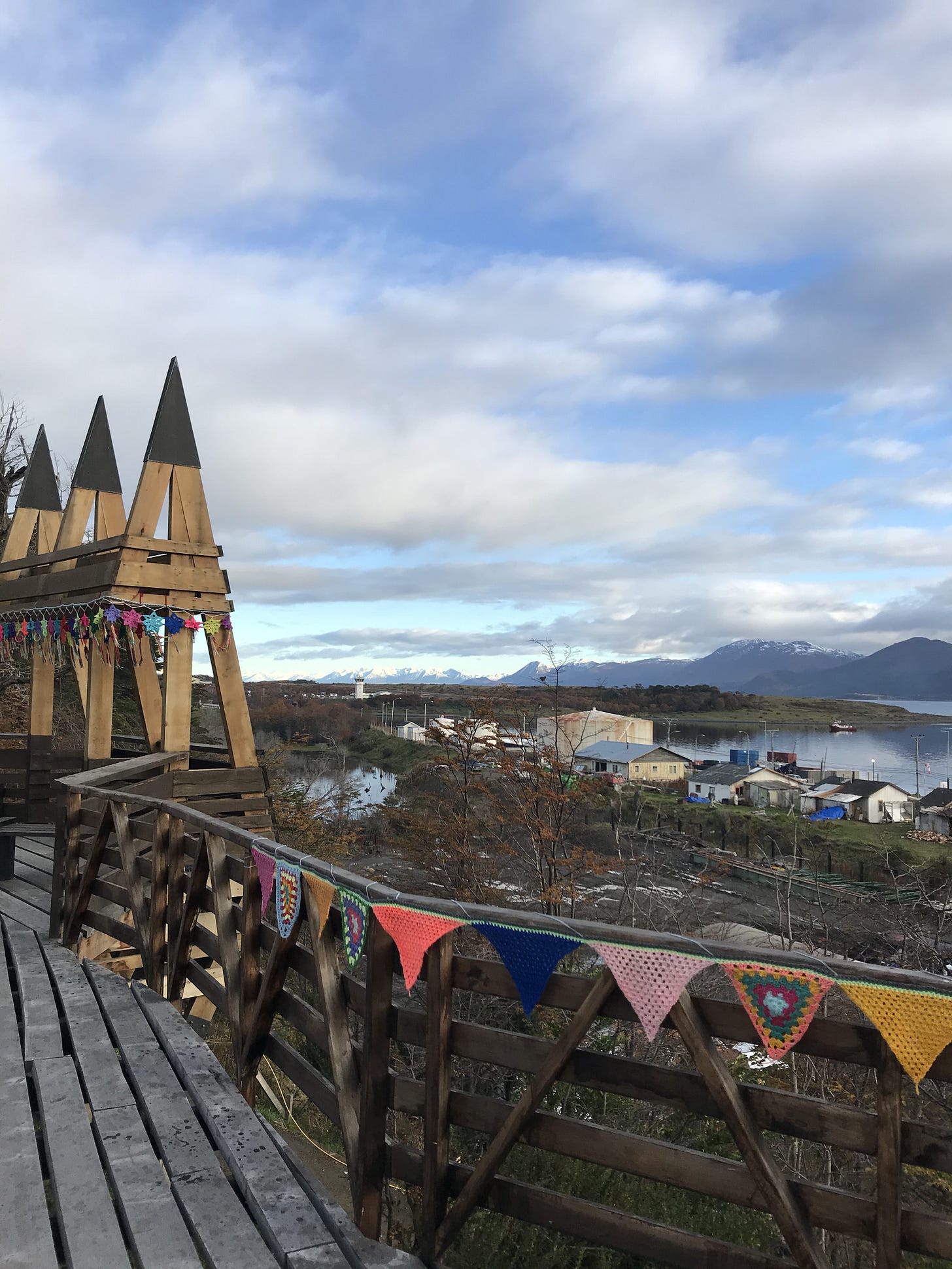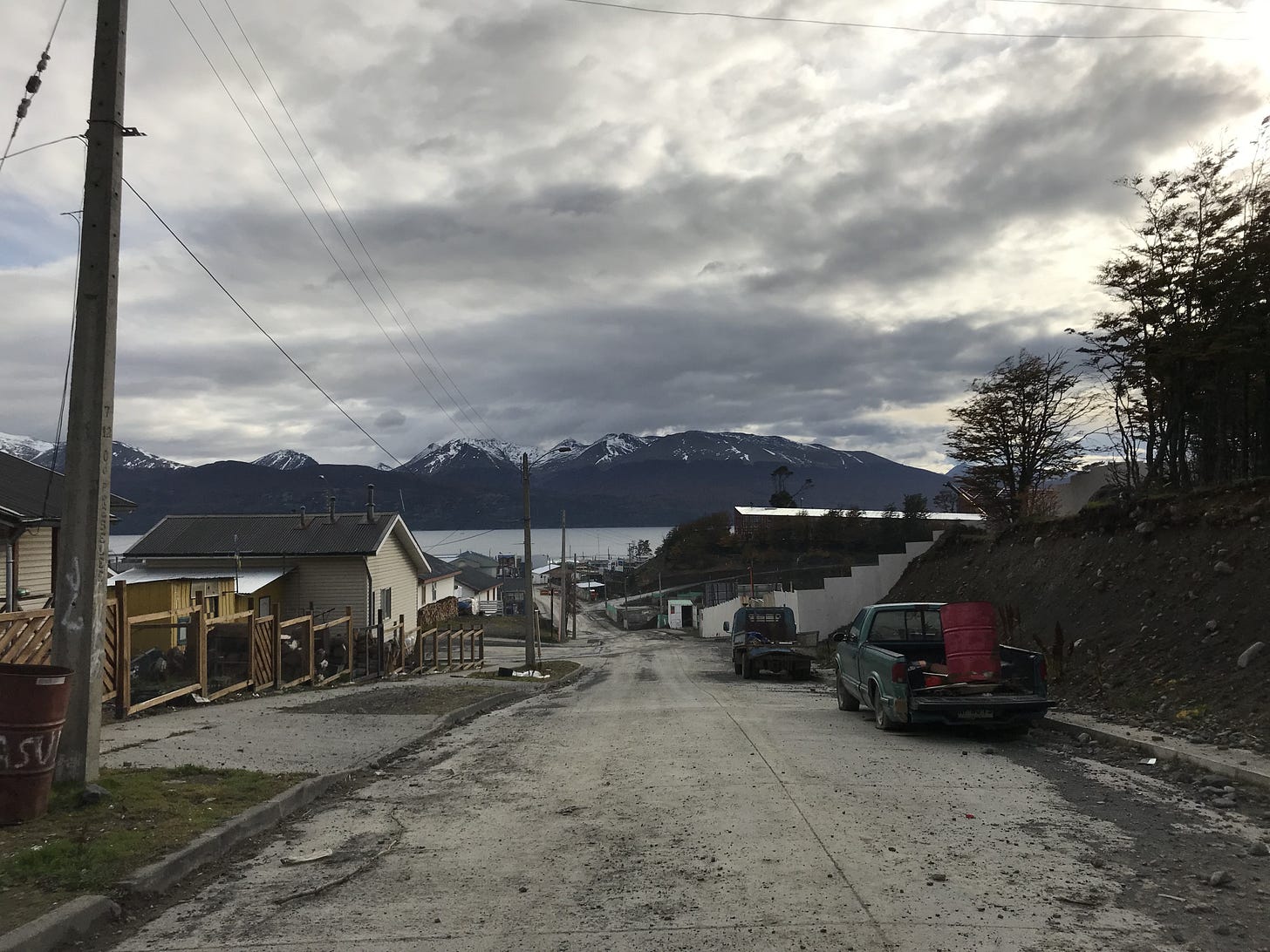Stranded in Chilean Tierra del Fuego, Part 2
How I made some new friends on an island at the end of the world
[See Part 1 here for how I got stranded on the Chilean side of the Beagle Channel!]
When I realized there wasn’t a boat back to Ushuaia the next day, as I’d been told, and that I was stranded indefinitely on an island in one of the most remote settlements in the world, I looked for a place to get lunch. I needed food, and I needed a chance to consider my options.
As a town too small for a stoplight, Puerto Williams’ restaurant options were limited. I picked one with a stuffed owl in the window and a promising beer menu. I was glad for a quiet place to sit, and I enjoyed the local(ish) beer. But after I ordered I noticed rat poison on the floor…and realized the owl might have been more than a decorative quirk. (Is this where I should mention I’m irrationally afraid of rodents?)
At a neighboring table was a very white group of adults that I assumed were Mormons. The woman was in skirt and heels, and the men wore ties. They were drinking ginger ale. They spoke English amongst themselves, but one of the group, a red-head, spoke perfect Spanish as well as English and seemed to serve in the role of translator for the others in the earnest conversation they were having with someone who I assumed was a local.
I wondered how the English-speakers had gotten there, where they were from originally, and how they were getting back home—but, unfortunately for my purposes, it seemed like they weren’t planning on leaving Puerto Williams any time soon. I would have to find another group to fill up the boat or figure out another way back to Ushuaia.

While remote, Puerto Williams isn’t entire disconnected from the outside world: it has an airport and a weekly ferry that brings commercial goods and passengers. My problem, really, was one of destination, timing, and logistics. I needed to get back to Ushuaia, the Argentinian city across the channel, whose lights were visible on the horizon at night.
But the ferry went to the closest Chilean city: Punta Arenas, a 30-hour trip by boat. From there, I would need to take a 3-day bus trip, with multiple transfers and stopovers, to get back to Ushuaia. Plus, the ferry only showed up on Saturdays, and it was Monday when I arrived.
Likewise, the planes only flew to Chilean destinations. Then I would need to fly all the way back to Buenos Aires and get another flight to Ushuaia—which would almost double the cost of my entire trip. I paid for a lot of my original tickets using credit card points and saved-up travel miles, and I really couldn’t afford to pay for new tickets.
So it was worth it to wait for the tourist company’s boat to fill up with other passengers: a 45-minute drive with a 30-minute boat ride was much quicker and less expensive. It was unpredictable, but worth it. If that failed, I figured I could take the ferry on Saturday.

Once I’d clarified for myself there wasn’t much I could do other than wait, I was ready to explore a bit.
I had in mind a hostel where I was planning to stay, but it was too early to check in. From my host family in Ushuaia, I’d gotten the contact information for one of their son’s friends who was working in Puerto Williams, so I went ahead and messaged him. I hadn’t thought I’d need the contact for just an overnight of research, but when I realized I was stranded, I was grateful to have a friend of a friend nearby who knew of my situation and who could give me local perspective.
“Come on by and we can talk!” he told me.
I felt strange showing up at a stranger’s house, but I figured I could trust this person because our mutual friends had recommended him so highly. Humberto Molina, I’d heard, was an Argentinian working in Puerto Williams for the tourist season while his partner and young baby stayed behind in Ushuaia.
It turned out he was working alongside his German employer, Volf, to repair the roof of Volf’s cottage. Both men took a tea break to talk with me with when I showed up, and they warmly welcomed me inside.
“Come in, come in!” they told me. “Any friend of the Lobos family is more than welcome here!”
This was my first real taste of Fuegian hospitality—people who had no need to be kind to me but who went above and beyond to treat me well. Hospitality is an essential part of life in such places, I later learned, and I was grateful for it just then.
Keep reading with a 7-day free trial
Subscribe to Writing Fireland to keep reading this post and get 7 days of free access to the full post archives.



